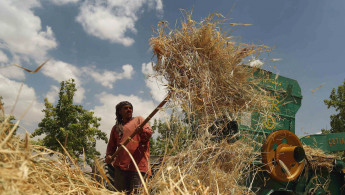Syrians' stomachs go empty, while farmers' fields wither
Syria's food production levels are currently at record lows and war time conditions have made it increasingly difficult to farm. This is also having an affect on Syrians in towns and cities.
"Today, we see almost 80 percent of households across Syria struggling with a lack of food or money to buy food - and the situation is only going to become worse if we fail to support farmers," said Abdessalam Ould Ahmed, assistant director-general at the Food and Agriculture Organisation (FAO).
Economic conditions in Syria have declined over the past year with the country's GDP shrinking 5.3 percent in 2015. Economists expect a further contraction of 3.3 percent in 2016.
At the same time, inflation went up 38 percent due to a general shortage of supplies.
The special report - entitled the "FAO/WFP crop and food security assessment mission to the Syrian Arab Republic" - was based on data gathered during a fact-finding mission from 15 June to 1 July 2016.
The researchers estimated that farmers had planted 900,000 hectares of wheat in the previous twelve months, which was a 40 percent drop on the 1.5 million hectares planted prior to 2011.
"The food security situation of millions of people inside Syria continues to deteriorate with more than seven million people classified as food insecure across the country," said Muhannad Hadi, regional director for the WFP.
The report found that these food shortages had also caused a severe reduction in the headcount of the country's livestock.
"Poultry, the usual main and most affordable source of protein of animal origin, has shrunk by 60 percent," the researchers said in the report.The FAO reports a total of 9.4 million people in Syria who require food assistance, an increase of 716,000 on September 2015.



